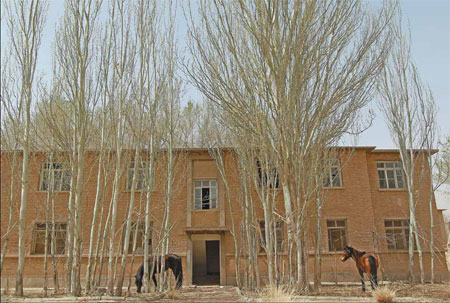Former military base opens doors
Updated: 2013-06-03 07:37
By Cui Jia and Mao Weihua (China Daily)
|
||||||||
A home for herders
Now, what was once China's main top-secret facility has become a home for herdsmen.
Aoriliman's family moved to the base when the researchers began to withdraw. Her family lives in the researchers' old accommodation blocks, along with many herdsmen from the Mongolian ethnic group in Nayinke village. Each of the 30 or so households owns at least seven rooms in the identical two- and three-story buildings constructed on both sides of an old cinema. Sheep are kept in pens set up on the land between the buildings.
 |
|
The remains of Malan military base in the Xinjiang Uygur autonomous region have become a home for herdsmen. Below: Local resident Aoriliman, 29, enters the former command office at the base. Photos by Cui Meng / China Daily |
"My mother, who lived in the mountains nearby, used to sneak into the cinema to watch movies when the soldiers were here," said the 29-year-old. Aoriliman's mother, who passed away in 2005, often told her stories about the base. "She said the soldiers were very kind to the herdsmen and allowed the villagers to buy goods from their grocery store."
At the peak, more than 1,500 herdsmen lived in the former military facility. However, in 2012, the local government decided to turn the area into a tourist park to help visitors connect with history, and most of the residents moved away.

"Many generations of my family have herded in this area. We had to make room for the military base and now for a park. In the old days, their faith in the nuclear program made people work hard, but now they only work for money," said Bayingele, pulling his grandson out of a sheep pen. The 3-year-old had been shooting at the animals with his toy guns - the only firearms seen on the base nowadays.
In days gone by, the base was patrolled by scores of armed guards. "They never said a word about their work," Bayingele recalled. The herdsmen moved in once the center had been abandoned, and gradually learned about the facility's original purpose. "I used to worry that there might still be radioactivity in the buildings, but everyone seems to be healthy," said the 50-year-old.
Bayingele's family will move to another village soon and he said he will miss the base: "I feel like a guardian here. I hope everything will be kept as it is."
"The generals' building" is the name the herdsmen bestowed on the tallest building on the base, opposite the cinema. The building was the brain center of the research center, because 29 generals from the People's Liberation Army successively led research teams there. Deng Jiaxian, a nuclear physicist revered as the "father of the Chinese nuclear bomb", also carried out tests at Malan.
The walls of the buildings bear cracks caused by an earthquake in 2010 and many of the windows are broken. At ground level, the floors are covered with a thick layer of dust and sheep droppings. A slogan painted on the wall reads: "Firmly safeguard the commanding officer led by Chairman Mao".
A glimpse of history
All the local herdsmen are familiar with the manmade tunnel in the mountain behind the generals' building. Rooms were built along the 300-meter tunnel, which is now shrouded in darkness, and old metal telephone boxes still hang on the walls. A dead dog lay in the middle of the tunnel, sending a chill down people's spines.
The tunnel, which served as a bomb shelter for the command office, will become a key attraction when the park opens to the public in 2015. The well-preserved facilities will take people back in time, said Sun Guijun, deputy director of Heshuo county tourist bureau, who was conducting surveying work at the site.
He said the research center was the place scientists analyzed the results of the explosive tests, so there was no need to worry about radioactivity, but he warned against approaching or entering any area where warning signs were displayed. The derelict buildings that once served as laboratories are also out of bounds. "The buildings, which were destroyed before the researchers left, probably still contain radioactivity," said Sun.
A former nuclear research and production center in Qinghai province was also turned into a tourist attraction after being decommissioned in 1987. China's first nuclear bombs were made there before being transported to Xinjiang for testing. A commemorative museum opened to the public in 2009.
"Many people are curious about these nuclear sites because they were once such a well-guarded secret. At the same time, people are inspired by the spirit of those days. The researchers couldn't even tell their families where they worked or what they did, because it was classified information," said Sun. "The nuclear tests have ended, but the spirit of hard work and dedication carries on."

 Michelle lays roses at site along Berlin Wall
Michelle lays roses at site along Berlin Wall
 Historic space lecture in Tiangong-1 commences
Historic space lecture in Tiangong-1 commences
 'Sopranos' Star James Gandolfini dead at 51
'Sopranos' Star James Gandolfini dead at 51
 UN: Number of refugees hits 18-year high
UN: Number of refugees hits 18-year high
 Slide: Jet exercises from aircraft carrier
Slide: Jet exercises from aircraft carrier
 Talks establish fishery hotline
Talks establish fishery hotline
 Foreign buyers eye Chinese drones
Foreign buyers eye Chinese drones
 UN chief hails China's peacekeepers
UN chief hails China's peacekeepers
Most Viewed
Editor's Picks

|

|

|

|

|

|
Today's Top News
Shenzhou X astronaut gives lecture today
US told to reassess duties on Chinese paper
Chinese seek greater share of satellite market
Russia rejects Obama's nuke cut proposal
US immigration bill sees Senate breakthrough
Brazilian cities revoke fare hikes
Moody's warns on China's local govt debt
Air quality in major cities drops in May
US Weekly

|

|







